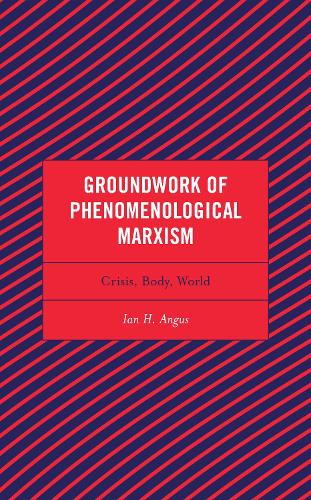
Groundwork of Phenomenological Marxism: Crisis, Body, World
(Hardback)
Publishing Details
Groundwork of Phenomenological Marxism: Crisis, Body, World
By (Author) Ian H. Angus
Bloomsbury Publishing PLC
Lexington Books
26th July 2021
United States
Classifications
Professional and Scholarly
Non Fiction
Philosophy of science
Impact of science and technology on society
Sociology
335.411
Winner of Book Award 2022
Physical Properties
Hardback
558
Width 163mm, Height 241mm, Spine 38mm
957g
Description
Beginning from the program for phenomenology set forth in Edmund Husserls The Crisis of the European Sciences and Transcendental Phenomenology, Ian H. Angus investigates the crisis of reason in a contemporary context. In Groundwork of Phenomenological Marxism: Crisis, Body, World, Angus connects the late work of Marx to human motility, natural fecundity (excess), and ecology. Anguss overall conception of phenomenology is Socratic in that it is concerned with the presuppositions and application of knowledge-forms to their lifeworld grounding. He argues that the crisis produced by the formalization of reason creates an inability to foster differentiated community as expected by both Husserl and Marx and that the formalization of human motility by the regime of value reveals the ontological productivity of natural fecundity (excess) and shows the priority of ecology as the contemporary exemplary science. Husserls idea of Europe as the home for philosophy is surpassed. Angus further argues that the contemporary task for Socratic phenomenology is in the epochal confrontation between planetary technology and place-based Indigeneity. He demonstrates that community and labor depend upon natural fecundity (excess) and locates their realization in the dialogue between civilizational-cultural lifeworlds, especially with respect to their ecological formation and access to transcendentality. This book lays out the fundamental concepts of a systematic phenomenological Marxian philosophy.
Reviews
"Groundwork of Phenomenological Marxism is an extraordinary tour de force. The passionate and relentlessly erudite scholarship that unfolds on these pages is at once staggeringly wide and impressively deep. Through meticulous yet critical reinterpretations of Husserl and Marx, Ian Angus establishes a systematic parallel that gives an unprecedented boost to phenomenological Marxism as a project of radical critique, and on this basis goes on to develop a powerful and auspicious new philosophical framework for confronting the global crises of the twenty-first century. Angus book is an achievement of the highest importance that will inspire many readers for years to come."
-- Bryan Smyth, University of MississippiAuthor Bio
Ian H. Angus is professor emeritus of humanities at Simon Fraser University.
